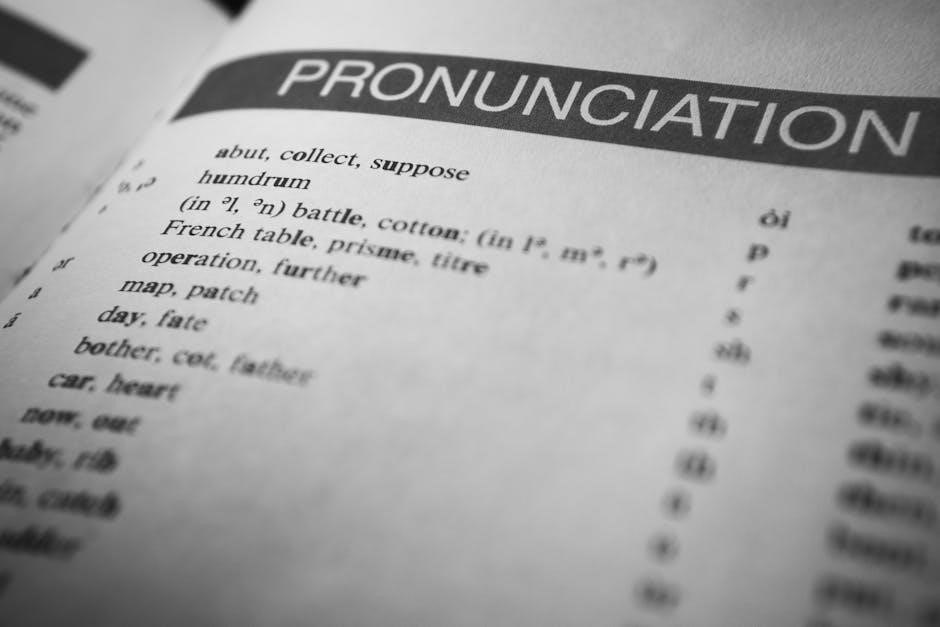
english language revision booklet pdf
This booklet provides comprehensive support for GCSE English Language revision, offering exam structure reminders, key techniques, and practice questions. It includes active strategies and feedback guidance to help students prepare effectively and achieve higher grades.
Overview of the Booklet’s Purpose
This booklet is designed to serve as a comprehensive resource for GCSE English Language students, providing structured guidance to excel in their exams. Its primary purpose is to bridge the gap between classroom learning and exam performance by offering clear explanations, practical strategies, and ample practice opportunities. The booklet focuses on key exam skills such as reading comprehension, language analysis, and writing techniques, ensuring students are well-prepared for both Paper 1 and Paper 2. It includes model answers, sentence stems, and annotated examples to help students understand how to approach questions effectively. Additionally, the booklet emphasizes active revision methods, encouraging students to engage with content through group work, self-study, and teacher feedback. By aligning with exam board specifications, it ensures relevance and effectiveness, making it an indispensable tool for achieving success in GCSE English Language.
Target Audience and Benefits
This revision booklet is specifically designed for GCSE English Language students, particularly those preparing for AQA and Edexcel exams. It caters to learners who need structured guidance to improve their exam performance. The booklet benefits students by providing exam-focused content, including model answers, practice questions, and strategies for active revision. It helps students develop essential skills such as reading comprehension, language analysis, and writing techniques. Additionally, it supports teachers by offering resources for feedback and classroom activities. The clear, concise format makes it accessible for independent study, group work, or teacher-led sessions. By using this booklet, students can gain confidence, improve their understanding of exam requirements, and achieve higher grades in their GCSE English Language exams.

Structure of the Revision Booklet
The booklet is organized by exam papers, focusing on key sections like reading, writing, and language analysis. It includes practice questions, model answers, and revision strategies for success.
Organization by Exam Papers (Paper 1 and Paper 2)
The booklet is structured to align with the two exam papers, Paper 1 and Paper 2, each focusing on distinct skills. Paper 1 emphasizes creative reading and writing, while Paper 2 explores writers’ viewpoints and perspectives. Each section includes sample questions, model answers, and strategies tailored to the specific demands of the papers. For Paper 1, students will find guidance on analyzing texts and crafting creative responses. Paper 2 focuses on non-fiction texts, including 19th-century and modern works, with tips on identifying and interpreting writers’ perspectives. The clear organization ensures students can target their revision effectively, addressing each paper’s unique requirements and building confidence for the exams.
Key Sections and Features
The booklet includes essential sections designed to enhance revision efficiency. It offers practice questions for both Paper 1 and Paper 2, along with model answers to illustrate high-quality responses. Additionally, the guide provides sentence stems and essay phrases to help students structure their answers effectively. Flashcards are recommended for memorizing key techniques and terminology, while summarization exercises aid in retaining important concepts. The booklet also emphasizes the importance of active revision, suggesting group work and self-study strategies. Furthermore, it encourages seeking teacher feedback and engaging in peer reviews to refine skills. These features collectively create a well-rounded resource that supports both independent and collaborative learning, ensuring students are thoroughly prepared for their exams.

Key Skills Covered in the Booklet
The booklet focuses on reading comprehension, writing techniques, and language analysis, providing strategies to tackle exam questions effectively. It also covers essay structuring and textual analysis skills.
Reading Comprehension Strategies
The booklet emphasizes reading comprehension strategies to help students effectively analyze and interpret texts. It focuses on identifying the writer’s purpose, tone, and key themes. Techniques include close reading, annotating texts, and understanding how language creates effects. Students learn to recognize shifts in focus and how to extract relevant information efficiently. The guide also covers strategies for tackling non-fiction texts, such as identifying persuasive devices and understanding contextual references. By mastering these skills, students can approach exam questions with confidence, ensuring they address the question fully and provide detailed, accurate responses. These strategies are particularly useful for AQA Paper 2, where understanding writers’ viewpoints is crucial.
Writing Techniques and Skills
The booklet focuses on refining writing techniques and skills essential for success in GCSE English Language exams. It provides model answers and sentence stems to guide students in structuring coherent responses. Key areas include crafting persuasive arguments, descriptive writing, and analytical essays. The guide emphasizes the importance of varied vocabulary, precise grammar, and effective sentence structure. Students learn how to tailor their writing to specific question types, ensuring clarity and relevance. Additionally, the booklet offers tips for maintaining a formal tone while engaging the reader. By practicing these techniques, students can develop confident and polished writing styles, enabling them to achieve higher grades in both Paper 1 and Paper 2 exams.

Revision Strategies for Success
Effective revision involves active techniques like flashcard creation, summarization, and regular practice. Seek teacher feedback, engage in peer reviews, and maintain structured study plans to ensure consistent progress and improved exam performance.
Active Revision Techniques
Active revision involves engaging with material beyond passive reading. Techniques include creating flashcards, summarizing key concepts, and participating in group discussions. Practice questions and model answers from the booklet help refine exam skills. Regularly reviewing and organizing notes ensures better retention; Teaching concepts to others or recording audio summaries can deepen understanding. Using visual aids like mind maps and timelines enhances retention. Incorporating short, focused study sessions with breaks improves concentration. Actively applying strategies like self-quizzing and past paper practice builds confidence and familiarity with exam formats. These methods ensure a dynamic and effective approach to revision, keeping the mind engaged and improving overall performance. Consistency and variety in revision techniques are key to achieving success in the English Language exam.
Time Management and Study Plans
Effective time management is crucial for successful revision. Create a structured study schedule, allocating specific time slots for each topic and practice. Prioritize tasks based on exam weightage and personal weaknesses. Set realistic goals for each session to maintain focus and productivity. Use techniques like the Pomodoro Method (25 minutes study, 5 minutes break) to stay efficient. Regularly review and adjust your study plan to ensure progress. Incorporate dedicated time for practice papers and model answers to build exam familiarity. Avoid cramming by spreading revision evenly across weeks. By organizing your time wisely, you can cover all necessary content without overwhelming yourself, ensuring a balanced and effective approach to exam preparation.

Practice Questions and Model Answers
This section provides sample questions and detailed model answers to help students practice exam techniques and improve their responses. Use these to refine your skills effectively.
Sample Questions for Each Paper
The booklet includes a range of sample questions for both Paper 1 and Paper 2, mirroring the format of actual exams. These questions cover various topics and text types, allowing students to practice their skills in reading comprehension, language analysis, and creative writing. Each question is accompanied by a model answer, providing clear examples of how to structure responses effectively. By working through these sample questions, students can familiarize themselves with the exam format, identify areas for improvement, and refine their techniques. The questions are designed to reflect the types of texts and themes commonly found in AQA and Edexcel exams, ensuring targeted and relevant practice. Regularly practicing these questions helps build confidence and exam readiness.
How to Use Model Answers Effectively
Model answers in the revision booklet are designed to guide students in understanding how to structure and present their responses. Start by reading the question carefully, then compare your answer to the model to identify strengths and areas for improvement. Pay attention to key techniques, such as how to select relevant information, analyze language, and organize ideas logically. Use the models to learn how to address different question types and adapt your writing style. Focus on understanding the reasoning behind the answers rather than memorizing them. Regularly practicing with model answers helps refine your skills and builds confidence in tackling exam questions effectively. This approach ensures you develop a clear and structured way of responding to achieve higher grades.

Focus on AQA English Language
This section highlights AQA Paper 1 and Paper 2, focusing on explorations in creative reading and writing, and writers’ viewpoints. It includes sample questions and model answers to help students master AQA-specific techniques and strategies for success.
AQA Paper 1: Explorations in Creative Reading and Writing
AQA Paper 1 focuses on reading and writing skills, with a 1 hour 45-minute exam worth 50% of the GCSE English Language grade. Students analyze extracts from 19th and 20th-century texts, demonstrating comprehension and language analysis. The paper includes two sections: reading comprehension and creative writing. For reading, students identify themes, tone, and language techniques, while the writing section requires crafting a descriptive or narrative text. Model answers and sample questions in the revision booklet provide examples of high-quality responses. Techniques such as identifying writer intent and using sentence stems are emphasized. Regular practice with past papers and feedback from teachers is crucial for improvement. Active revision strategies, like creating flashcards for key phrases, also support success. This section equips students with the tools to excel in both reading and writing tasks, ensuring they are well-prepared for the exam.
AQA Paper 2: Writers’ Viewpoints and Perspectives
AQA Paper 2 assesses students’ ability to compare and analyze non-fiction texts from different time periods, focusing on how writers present viewpoints. The exam includes two unseen texts, one from the 19th century and another from the 20th or 21st century. Students must identify and explain the writers’ perspectives, supported by textual evidence. The revision booklet provides sample questions, model answers, and strategies for effective analysis. Techniques such as highlighting key phrases and using sentence stems are recommended. Regular practice with past papers and feedback from teachers is essential. Active revision strategies, like creating flashcards for key terms, also aid preparation. This section helps students develop the skills to interpret and compare texts effectively, ensuring they are well-equipped for the exam.

Edexcel IGCSE English Language Revision
This booklet supports Edexcel IGCSE English Language revision with practice questions, annotated examples, and structured approaches to help students master reading, writing, and analytical skills effectively.
Component 1: Reading and Writing

Component 1 focuses on reading and writing skills, with a emphasis on non-fiction texts from the 19th century and modern periods. Students analyze and interpret texts, developing comprehension strategies. Writing tasks include essays and text-based responses, requiring clear, coherent, and persuasive language. The booklet provides practice questions, model answers, and sentence stems to guide students. It also covers techniques for identifying and explaining language devices, tone, and purpose. Regular practice and feedback are encouraged to refine skills. This section ensures students are well-prepared for the exam, helping them understand question structures and improve their ability to articulate responses effectively.
Component 2: Literature and Poetry
Component 2 focuses on the analysis and interpretation of literary texts and poetry. Students explore themes, characters, and language use in prose and poetic extracts. The revision booklet provides practice questions, model answers, and analysis techniques to help students develop their skills. It emphasizes understanding different writers’ perspectives and how to structure essays effectively. The booklet also includes guidance on identifying and explaining literary devices, such as metaphors and similes, and how to link these to the overall meaning of the text. Regular practice with past papers and feedback from teachers are encouraged to refine analytical skills and improve essay writing. This section ensures students are confident in tackling both modern and classic literature with clarity and depth.

Using Flashcards and Summarization
Flashcards help memorize key terms and techniques, while summarization aids in condensing complex ideas. Both methods promote active learning and effective retention of revision material for exams.
Creating Effective Flashcards
Flashcards are a powerful tool for revising key terms, concepts, and techniques. To create effective ones, keep information concise and focused on one idea per card. Use keywords or phrases on the front and detailed explanations or examples on the back. For English Language revision, include terms like “similes” or “persuasive devices” with clear definitions. Organize cards by topic, such as Reading Comprehension or Writing Skills, and review them regularly. Incorporate color-coding or symbols to highlight important points. Additionally, summarize key concepts on the back of each card to reinforce understanding and retention. Regular review helps embed information into long-term memory, making flashcards an essential revision aid.
Summarizing Key Concepts
Summarizing key concepts is a crucial revision strategy that helps condense complex information into manageable chunks. Start by identifying the main ideas in a text or topic, then rephrase them in your own words. Use bullet points or short sentences to capture essential details. For English Language revision, focus on summarizing techniques like language analysis, tone, and structure. Practice summarizing model answers to understand how to present ideas clearly. Regularly review your summaries to reinforce retention and ensure you can apply the concepts to exam questions. This method not only saves time but also enhances understanding, making it easier to recall information during exams. Consistent practice will improve your ability to articulate ideas effectively.
Importance of Feedback and Review
Feedback and review are essential for improving writing and analysis skills. Seek teacher feedback to refine your responses and use peer review to identify areas for improvement. Regular self-assessment helps track progress and enhances exam readiness.
Seeking Teacher Feedback
Seeking teacher feedback is crucial for improving your performance in GCSE English Language. Teachers can provide detailed insights into your strengths and areas for improvement, helping you refine your responses. Use practice papers and model answers from the revision booklet to submit to your teacher for constructive criticism. Regular feedback allows you to track your progress and address weaknesses effectively. Additionally, teachers can guide you on how to approach specific question types and improve your writing techniques. By incorporating their suggestions, you can enhance your exam skills and achieve better results. Make it a habit to review their comments and ask questions to clarify any doubts, ensuring you make the most of their expertise.
Peer Review and Self-Assessment
Peer review and self-assessment are essential tools for effective revision. By exchanging practice answers with classmates, you can gain new insights and identify areas for improvement. Use the revision booklet’s model answers as a benchmark to evaluate your work. Self-assessment involves reflecting on your progress, identifying strengths, and addressing weaknesses. Create flashcards to summarize key concepts and techniques, helping you retain information better. Regularly reviewing your own work and seeking feedback from peers fosters a deeper understanding of exam requirements. This collaborative approach enhances your ability to refine your skills independently, ensuring you are well-prepared for the exam. Make self-assessment a routine part of your revision process to track your growth and confidence.

Additional Resources and Guides
Supplement your revision with recommended guides like Mr. Bruff’s GCSE English Language resources and AQA sample papers. Utilize online tools and videos for targeted exam preparation support.
Recommended Revision Guides
For effective revision, consider using AQA’s official revision booklets, which provide detailed exam insights and practice questions. Edexcel’s IGCSE English Language guides are also highly recommended for structured learning. Additionally, Mr. Bruff’s GCSE English Language revision guides, available on Amazon, offer practical tips and strategies. Online resources like sample papers from AQA and Edexcel websites can further enhance your preparation. Many free PDF booklets, such as the AQA Paper 1 and Paper 2 revision packs, are available for download. These guides cover key skills, exam techniques, and model answers, ensuring a comprehensive approach to your studies. Utilize these resources alongside your notes for a well-rounded revision strategy.
Online Tools and Videos
Supplement your revision with online tools and videos designed to enhance your understanding of GCSE English Language. YouTube channels like Mr. Bruff’s offer detailed explanations and tips for tackling exam questions. Videos breaking down how to achieve a Grade 9, such as those by top-performing students, provide valuable insights. Additionally, educational websites offer interactive quizzes and practice exercises to test your skills. Many revision guides, including those by AQA and Edexcel, are accompanied by video tutorials that explain complex concepts. These resources are ideal for visual learners and can be used alongside your revision booklet to reinforce key strategies and techniques. Utilize these tools to create a well-rounded study plan that suits your learning style.
Stay motivated, organize your materials, and use active strategies like flashcards. Seek feedback, summarize key concepts, and practice consistently. Confidence and preparation are key to success.
Staying Motivated and Confident
Staying motivated and confident is crucial for effective revision. Set achievable goals, celebrate small successes, and remind yourself of your progress. Engage in active revision techniques like group discussions or flashcard quizzes to keep learning dynamic. Surround yourself with positive influences and maintain a growth mindset. Regularly review model answers and seek feedback to build confidence in your abilities. Use study plans to stay organized and focused, ensuring consistent practice. Believe in your potential and stay positive, even when challenges arise. Motivation and confidence will drive your success in the English Language exam.
Final Exam Preparation
Final exam preparation involves thorough review and strategic planning. Ensure you understand the exam format, including question types and time allocations. Practice under timed conditions to build stamina and time management skills. Review model answers to refine your writing techniques and familiarize yourself with marking criteria. Focus on weak areas identified through practice papers and seek targeted feedback. Organize your materials, including flashcards and revision notes, for easy access. Stay calm and well-rested before the exam, and maintain a positive mindset. By systematically addressing each aspect of the exam, you can approach the final test with confidence and readiness.